疑问句大全——_一般疑问句
一般疑问句、特殊疑问句、选择疑问句
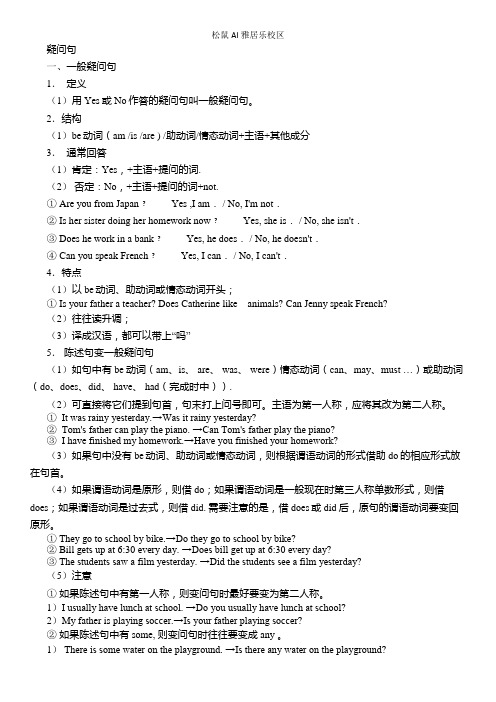
疑问句一、一般疑问句1.定义(1)用Yes或No作答的疑问句叫一般疑问句。
2.结构(1)be动词(am /is /are ) /助动词/情态动词+主语+其他成分3.通常回答(1)肯定:Yes,+主语+提问的词.(2)否定:No,+主语+提问的词+not.① Are you from Japan﹖Yes ,I am. / No, I'm not.② Is her sister doing her homework now﹖Yes, she is. / No, she isn't.③ Does he work in a bank﹖Yes, he does. / No, he doesn't.④ Can you speak French﹖Yes, I can. / No, I can't.4.特点(1)以be动词、助动词或情态动词开头;① Is your father a teacher? Does Catherine like animals? Can Jenny speak French?(2)往往读升调;(3)译成汉语,都可以带上“吗”5.陈述句变一般疑问句(1)如句中有be 动词(am、is、 are、 was、 were)情态动词(can、may、must …)或助动词(do、does、did、 have、 had(完成时中)).(2)可直接将它们提到句首,句末打上问号即可。
主语为第一人称,应将其改为第二人称。
①It was rainy yesterday.→Was it rainy yesterday?②Tom's father can play the piano. →Can Tom's father play the piano?③ I have finished my homework.→Have you finished your homework?(3)如果句中没有be动词、助动词或情态动词,则根据谓语动词的形式借助do的相应形式放在句首。
英语各种疑问句详细解释——_一般疑问句、特殊疑问句、选择疑问句、反意疑问句

各种疑问句的详细介绍疑问句(questions)指提出问题,请对方回答的句子。
疑问句句末要用问号。
按结构可分为四种:一般疑问句、特殊疑问句、选择疑问句、反意疑问句。
(一)一般疑问句1、一般疑问句概述一般疑问句(general questions),也可称为“yes/no” questions(是否型问句),因为它一般是由yes或no回答的,如:—Can you swim to the other side?你能游到对岸吗?—Yes, I can.是的,我能。
—No,I can’t.不,我不能。
—Have you locked the door?你锁门了吗?—Yes,I have.是的,锁了。
—No,I haven’t. 不,没有锁。
2一般疑问句的结构(1)基本的结构为:be/助动词/情态动词+主语+谓语/表语+(其他),句子要读升调,如:Are they your friends?他们是你的朋友吗?Does he go to school on foot?他是步行去上学吗?Will you be free tonight?你今晚有空吗?Can you play basketball?你会打篮球吗?(2)陈述句亦可用作一般疑问句,多用在非正式文体中,句末有问号,用升调,如:Somebody is with you?有人和你一起吗?He didn’t finish the work?他没有做完活吗?You are fresh from America,I suppose?我猜,你刚从美国回来吧?3、一般疑问句的答语(1)一般疑问句一般由yes或no来回答,如:—Are you tired?你累了吗?—Yes,I am.是的,累了。
—No, I’m not.不,不累。
—Does she do the cleaning?她扫除了吗?—Yes ,she does.是的,她打扫了。
—No,she doesn’t.不,她没打扫。
(完整版)英语疑问句用法大全
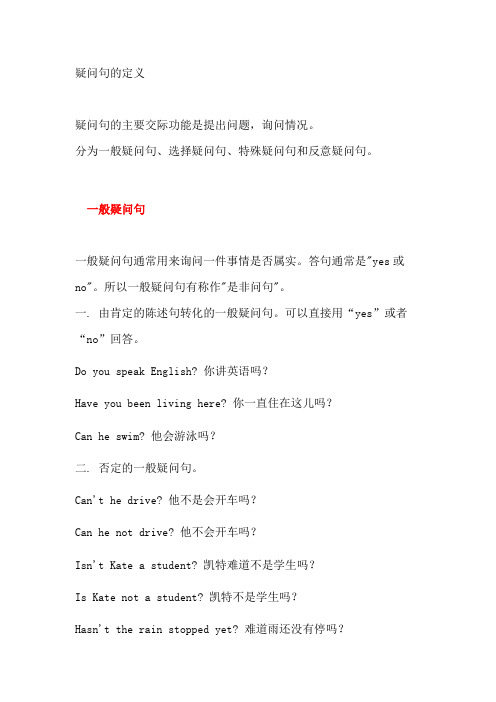
疑问句的定义疑问句的主要交际功能是提出问题,询问情况。
分为一般疑问句、选择疑问句、特殊疑问句和反意疑问句。
一般疑问句一般疑问句通常用来询问一件事情是否属实。
答句通常是"yes或no"。
所以一般疑问句有称作"是非问句"。
一. 由肯定的陈述句转化的一般疑问句。
可以直接用“yes”或者“no”回答。
Do you speak English? 你讲英语吗?Have you been living here? 你一直住在这儿吗?Can he swim? 他会游泳吗?二. 否定的一般疑问句。
Can't he drive? 他不是会开车吗?Can he not drive? 他不会开车吗?Isn't Kate a student? 凯特难道不是学生吗?Is Kate not a student? 凯特不是学生吗?Hasn't the rain stopped yet? 难道雨还没有停吗?Has the rain stopped yet? 雨还没停吗?三. 回答否定形式的一般疑问句的注意事项:Isn't she very intelligent? 她难道不是很聪明吗?Yes, she is. 是的,她很聪明。
Is he not a student? 他不是学生吗?Yes, he is. 不,他是学生。
(错误的答语:No, he is.)小窍门:在回答的时候,只要把它当成没有加以否定形式的普通一般疑问句一样看待。
选择疑问句选择疑问句提出两个或两个以上可能的答案供对方选择。
这类疑问句由两部分组成:(一般疑问句)供选择的第一个部分 + 供选择的另一个部分 + ?Do you like to play football or basketball?你喜欢踢足球还是打篮球?Shall we walk, or shall we go by bus?咱们步行去,还是乘公共汽车去?Do you prefer apples, or pears, or plums, or cherries?你是喜欢苹果、梨子、李子还是樱桃?注意:有的选择疑问句不能用"yes或no"回答。
中考英语语法专题-特殊句型之疑问句

初中英语语法专题-特殊句型之疑问句疑问句按结构可分为四种:一般疑问句、特殊疑问句、选择疑问句、反意疑问句。
一、一般疑问句1、一般疑问句概述一般疑问句,也可称为是否型问句,因为它一般用yes或no回答的,基本的结构为:be/助动词/情态动词+主语+谓语/表语+(其他),句子要读升调。
对一般疑问句作肯定回答时,通常是Yes, 主语+be/助动词/情态动词;否定回答时,通常是No, 主语+be/助动词/情态动词+not,not通常用省略形式,如:---Can you swim to the other side?你能游到对岸吗?---Yes, I can. 是的,我能。
---No, I can’t. 不,我不能。
注意:回答一般疑问句除了用yes或no外,也可用certainly,probably,perhaps,of course,all right,with pleasure等代替yes,用never,not at all等代替no,使得语气更加客气,委婉,如:---Can you help me? 你能帮个忙吗?---Certainly. 当然。
---Could you please make less noise? 你可以小声一点吗?---All right, sir. 好的,先生。
---Have you been there? 你到过那里吗?---Never. 从来没有。
2. 一般疑问句的否定式一般疑问句的否定式,一般结构为:系动词/助动词/情态动词+not+主语,且一般用缩略形式,如:---Don’t you believe me? 你不相信我?(表惊讶)---Yes, I do. 不,我相信你。
---No, I don’t. 是的,我不信。
否定疑问句并不单纯表示提问,它常常带有感情色彩。
否定疑问句的完全式比简略式所表达的语气更强烈些。
否定的一般疑问句的答语中,yes的含义为“不”,no的含义为“是”,但在回答这类句子时,应该注意yes后接肯定结构,no后接否定结构,这和汉语习惯不同。
一般疑问句、特殊疑问句、选择疑问句、反义疑问句地详细用法
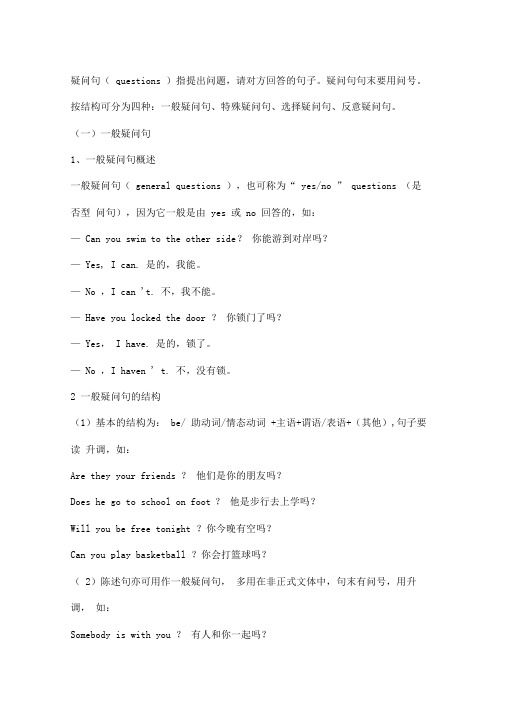
疑问句( questions )指提出问题,请对方回答的句子。
疑问句句末要用问号。
按结构可分为四种:一般疑问句、特殊疑问句、选择疑问句、反意疑问句。
(一)一般疑问句1、一般疑问句概述一般疑问句( general questions ),也可称为“ yes/no ” questions (是否型问句),因为它一般是由 yes 或 no 回答的,如:— Can you swim to the other side ?你能游到对岸吗?— Yes, I can. 是的,我能。
— No ,I can 't. 不,我不能。
— Have you locked the door ?你锁门了吗?— Yes, I have. 是的,锁了。
— No ,I haven ' t. 不,没有锁。
2 一般疑问句的结构(1)基本的结构为: be/ 助动词/情态动词 +主语+谓语/表语+(其他),句子要读升调,如:Are they your friends ?他们是你的朋友吗?Does he go to school on foot ?他是步行去上学吗?Will you be free tonight ?你今晚有空吗?Can you play basketball ?你会打篮球吗?( 2)陈述句亦可用作一般疑问句,多用在非正式文体中,句末有问号,用升调,如:Somebody is with you ?有人和你一起吗?He didn ' t finish the work ?他没有做完活吗?You are fresh from America , I suppose ?我猜,你刚从美国回来吧?3、一般疑问句的答语( 1)一般疑问句一般由 yes 或 no 来回答,如:— Are you tired ?你累了吗?— Yes,I am. 是的 ,累了。
— No, I ' m not. 不,不累。
— Does she do the cleaning ?她扫除了吗?— Yes , she does. 是的,她打扫了。
小学英语疑问句型汇总大全
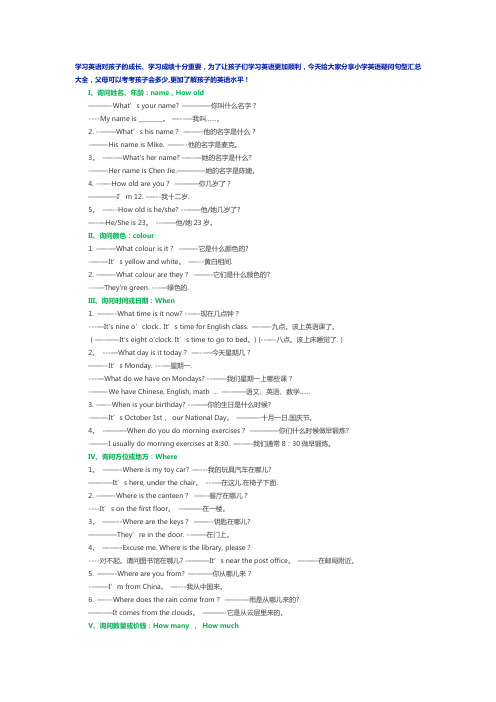
学习英语对孩子的成长、学习成绩十分重要,为了让孩子们学习英语更加顺利,今天给大家分享小学英语疑问句型汇总大全,父母可以考考孩子会多少,更加了解孩子的英语水平!I、询问姓名、年龄:name,How old———-What’s your name? ————你叫什么名字?----My name is ________。
—--—我叫……。
2. --——What’s his name?—-—-他的名字是什么?-——-His name is Mike. ——--他的名字是麦克。
3。
-—-—What's her name? -—-—她的名字是什么?-——-Her name is Chen Jie.————她的名字是陈婕。
4. --—-How old are you?-———你几岁了?————I’m 12. -—--我十二岁.5。
-—--How old is he/she? --——他/她几岁了?—-—He/She is 23。
--——他/她23岁。
II、询问颜色:colour1. -—-—What colour is it?-——-它是什么颜色的?-—-—It’s yellow and white。
—---黄白相间.2. -——-What colour are they?-——-它们是什么颜色的?---—They're green. ---—绿色的.III、询问时间或日期:When1. ——--What time is it now? --—-现在几点钟?---—It's nine o’clock.. It’s time for English class. —-—-九点。
该上英语课了。
(—-——It's eight o'clock. It’s time to go to bed。
) (--—-八点。
该上床睡觉了.)2。
---—What day is it today?—--—今天星期几?——--It’s Monday. ---—星期一.---—What do we have on Mondays? --——我们星期一上哪些课?-——-We have Chinese, English, math …—-——语文、英语、数学……3. -—--When is your birthday? --——你的生日是什么时候?-—-—It’s October 1st,our National Day。
一般疑问句的所有句子
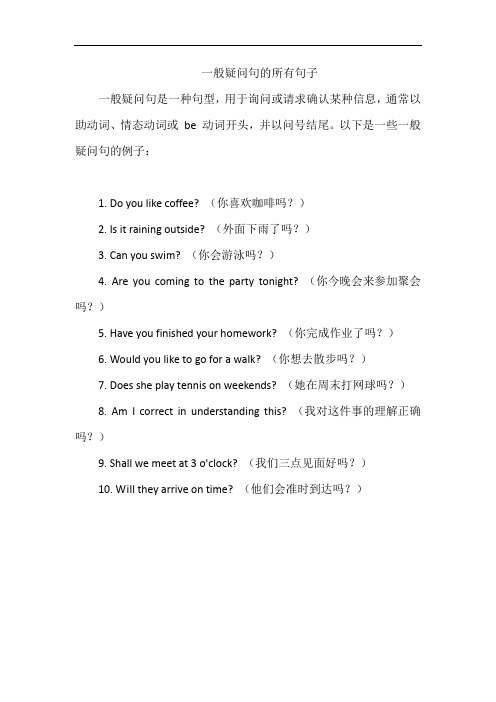
一般疑问句的所有句子
一般疑问句是一种句型,用于询问或请求确认某种信息,通常以助动词、情态动词或be 动词开头,并以问号结尾。
以下是一些一般疑问句的例子:
1. Do you like coffee? (你喜欢咖啡吗?)
2. Is it raining outside? (外面下雨了吗?)
3. Can you swim? (你会游泳吗?)
4. Are you coming to the party tonight? (你今晚会来参加聚会吗?)
5. Have you finished your homework? (你完成作业了吗?)
6. Would you like to go for a walk? (你想去散步吗?)
7. Does she play tennis on weekends? (她在周末打网球吗?)
8. Am I correct in understanding this? (我对这件事的理解正确吗?)
9. Shall we meet at 3 o'clock? (我们三点见面好吗?)
10. Will they arrive on time? (他们会准时到达吗?)。
特殊疑问句和一般疑问句的用法
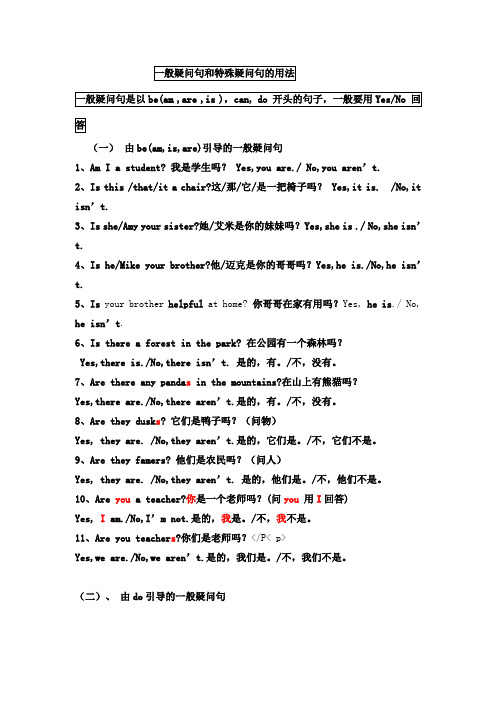
(一)由be(am,is,are)引导的一般疑问句1、Am I a student? 我是学生吗? Yes,you are./ No,you aren’t.2、Is this /that/it a chair?这/那/它/是一把椅子吗? Yes,it is. /No,it isn’t.3、Is she/Amy your sister?她/艾米是你的妹妹吗?Yes,she is ./ No,she isn’t.4、Is he/Mike your brother?他/迈克是你的哥哥吗?Yes,he is./No,he isn’t.5、Is your brother helpful at home? 你哥哥在家有用吗?Yes, he is./ No, he isn’t.6、Is there a forest in the park? 在公园有一个森林吗?Yes,there is./No,there isn’t. 是的,有。
/不,没有。
7、Are there any panda s in the mountains?在山上有熊猫吗?Yes,there are./No,there aren’t.是的,有。
/不,没有。
8、Are they dusk s? 它们是鸭子吗?(问物)Yes, they are. /No,they aren’t.是的,它们是。
/不,它们不是。
9、Are they famers? 他们是农民吗?(问人)Yes, they are. /No,they aren’t. 是的,他们是。
/不,他们不是。
10、Are you a teacher?你是一个老师吗?(问you 用I回答)Yes, I am./No,I’m not.是的,我是。
/不,我不是。
11、Are you teacher s?你们是老师吗?</P< p>Yes,we are./No,we aren’t.是的,我们是。
- 1、下载文档前请自行甄别文档内容的完整性,平台不提供额外的编辑、内容补充、找答案等附加服务。
- 2、"仅部分预览"的文档,不可在线预览部分如存在完整性等问题,可反馈申请退款(可完整预览的文档不适用该条件!)。
- 3、如文档侵犯您的权益,请联系客服反馈,我们会尽快为您处理(人工客服工作时间:9:00-18:30)。
疑问句大全疑问句(questions)指提出问题,请对方回答的句子。
疑问句句末要用问号。
按结构可分为四种:一般疑问句、特殊疑问句、选择疑问句、反意疑问句。
(一)一般疑问句1、一般疑问句概述一般疑问句(general questions),也可称为“yes/no” questions(是否型问句),因为它一般是由yes或no回答的,如:—Can you swim to the other side?你能游到对岸吗?—Yes, I can.是的,我能。
—No,I c an’t.不,我不能。
—Have you locked the door?你锁门了吗?—Yes,I have.是的,锁了。
—No,I haven’t. 不,没有锁。
2一般疑问句的结构(1)基本的结构为:be/助动词/情态动词+主语+谓语/表语+(其他),句子要读升调,如:Are they your friends?他们是你的朋友吗?Does he go to school on foot?他是步行去上学吗?Will you be free tonight?你今晚有空吗?Can you play basketball?你会打篮球吗?(2)陈述句亦可用作一般疑问句,多用在非正式文体中,句末有问号,用升调,如:Somebody is with you?有人和你一起吗?He didn’t finish the work?他没有做完活吗?3、一般疑问句的答语(1)一般疑问句一般由yes或no来回答,如:—Are you tired?你累了吗?—Yes,I am.是的,累了。
—No, I’m not.不,不累。
—Does she do the cleaning?她扫除了吗?—Yes ,she does.是的,她打扫了。
—No,she doesn’t.不,她没打扫。
2)回答一般疑问句除了用yes或no外,也可用certainly,probably,perhaps,of course,all right,with pleasure等代替yes,用never,not at all等代替no,如:—Can you help me?你能帮个忙吗?—Certainly.当然。
—Could you please make less noise?你可以小声一点吗?—All right,sir.好的,先生。
—Have you been there?你到过那里吗?—Never.从来没有。
4、一般疑问句的否定式(1)一般疑问句的否定式,一般结构为系动词/助动词/情态动词+not+主语;也可为系动词/助动词/情态动词+主语+not,如:Do you not/Don’t you believe me? 你不相信我?Believe me?你不相信我?Is it not / Isn’t it a lovely day? 天气难道不好吗?Are you not / Aren’t you coming?你不来吗?Will you not /Won’t you sit down? 你不坐会儿吗?Is he not / Isn’t he a doctor? 他不是医生吗?(2)否定疑问句并不单纯表示提问,它常常带有感情色彩。
否定疑问句的完全式比简略式所表达的语气更强烈些。
(3)否定的一般疑问句的答语中,yes的含义为“不”,no的含义为“是”,但在回答这类句子时,应该注意yes后接肯定结构,no后接否定结构,这和汉语习惯不同,如:—Are you not Mr Smith?你不是史密斯先生吗?—Yes,I am.不,我是。
—No,I am not.是的,我不是。
—Haven’t you read this book before?你从前没有读过这本书吗?—Yes,I have.不,我读过。
—No,I haven’t.是的,我没有。
—Don’t you play chess?你不下棋吗?—Yes ,I do.不,我下棋。
—No,I don’t.是的,我不下棋。
教你一招:在这样的答语中,只要根据实际情况来判断,如果事实上是,就要用yes;如果事实上不是,就要用no。
(二)特殊疑问句1、特殊疑问句概述特殊疑问句(special questions),也可称为“wh”-questions,因为它们多数都以who,where,when,which,whose,why这类词开头,如:Who is it on the phone?谁来的电话?How many oranges can you see in the picture?你能在图画上看到多少个橘子?Where did you last see it?你最后一次看到这东西时是在什么地方呢?What did you eat yesterday?你昨天吃了些什么?How do you usually go to school?你通常是怎么去学校的呢?2、特殊疑问句的构成及用法(1)它的结构一般为:特殊疑问词+一般疑问句,即:特殊疑问词+be/助动词/情态动词+主语+谓语/表语+(其他),如:What can be done about it?对此能做些什么呢?Which are yours?哪些是你的?Who would like to come for a game of football?谁愿意来踢场足球呀?What did you say?你说什么?Why didn’t you tell me?你为什么没有告诉我?(3)“why+一般疑问句否定式”这种结构一般表示劲告、建议、责备等,而不能归为特殊问句,如:Why don’t you come earlier?你为什么不早些来呢?Why not go skiing?为何不去滑雪呢?3、特殊疑问词特殊疑问词可分为两类:疑问代词和疑问副词(1)疑问代词疑问代词主要有五个,分别为:who,whom,which,what,whose。
它们没有性和数的变化,除了who外也没有格的变化。
Who is the girl under the tree?Who is not here?Whom谁作宾语,用来指人Whom are you writing to?Whom do you want to see?Whose谁的用来指所属关系,如果作定语,一般后接名词Whose pen is this?Whose are those shoes?Which哪个,哪些用来指对人或物在一定范围之内进行选择Which girls will be in the sports meeting?Which hat is lily’s ?What通常指物,也可指人,一般用在没有指出范围的情况下What can you see in the picture?What is in the teacher’s room?(2)疑问副词疑问副词包括when,where,why,how及how与其他副词和形容词组成的疑问词。
疑问副词when何时询问时间When will she return?Where何地询问地点Where do you come from?Why为什么询问原因Why are you late for school?How如何询问手段、方式、工具以及程度等How do you usually go to school?How old多大询问年龄How old is Jim’s little brother?How much/many多少询问数量How many friends do you have?How far多远询问距离How far is it from your home to school?How long多长、多久询问时间的长度或距离How long will you stay in Beijing?How often多长时间一次询问频率How often do you go to see your grandparents?How soon多久询问时间How soon will you come back4、特殊疑问句的答语特殊疑问句的答语的重点是对疑问词的回答非所问,因此,不再需要用yes或no。
在回答时,可以用一个词或词组,也可以用一个较为完整的句子。
Who has borrowed my bike?谁借了我的自行车?Jack. 杰克。
Jack has borrowed your bike.When did he borrow my bike?他什么时候借了我的自行车?This morning. 今天早晨。
He borrowed your bike this morning.Where is he?他现在在何处?At the office. 在办公室。
He is at the office.What is he doing there?他在那儿干什么呢?Working. 工作He is working.Whose bike is this?这辆自行车是谁的?Mr. Smith’s. 史密斯先生的。
It’s Mr. Smith’s bike.(三)选择疑问句1、选择疑问句概述选择疑问句(alternative questions)一般提出两种或两种以上的可能,问对方选择哪一种。
其结构可用一般疑问句,也可用特殊疑问句,供选择的两部分由or连接,前者用升调,后者用降调,如:Will you go there by bus or by train?你准备乘汽车,还是乘火车去那儿?What would you like,coffee or tea?你想要什么,咖啡还是茶?How many pens do you have ,one or two?你有几枝钢笔,一枝还是两枝?2、一般疑问句演化来的选择疑问句Is it right or wrong?是对还是错?Were you or he there?是你还是他在那儿?Are they reading,chatting or watching television?他们是在看书、聊天,还是在看电视?Do you want to go there by land or by air?你将乘车还是乘飞机去那儿?3、特殊疑问句演化来的选择疑问句Which do you like better,coffee or milk?你更喜欢喝什么,咖啡还是牛奶?What colour is it,red,blue or yellow?它是什么颜色,红的,蓝的,还是黄的?Where are you going,to the classroom or to the library?你要去哪儿,教室还是图书馆?How shall we go,by sea or by land?我们怎么去,走水路还是陆路?4、or not构成的选择疑问句Do you want to buy it or not?你是想买它还是不想买?Are you ready or not?你准备好了还是没有准备好?5、选择疑问句的答非所问语选择疑问句的答语必须是完整的句子或其省略式,不能用yes或no,如:—Do you go to work by bus or by bike?你乘公交车还是骑自行车去上班?—By bus.乘公交车。
